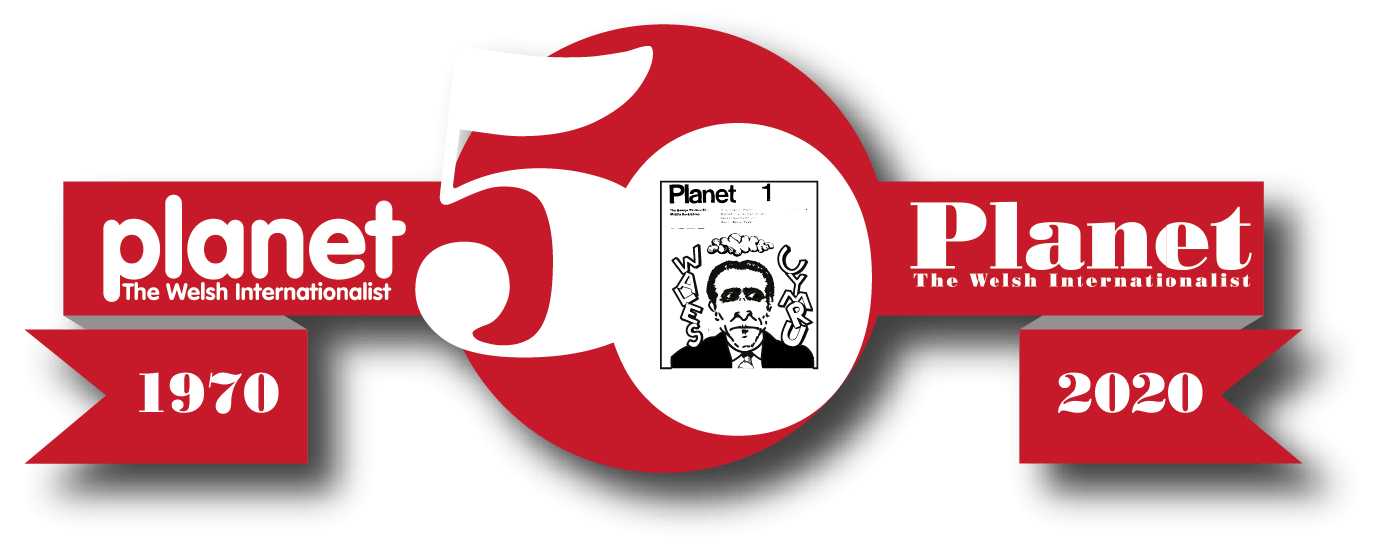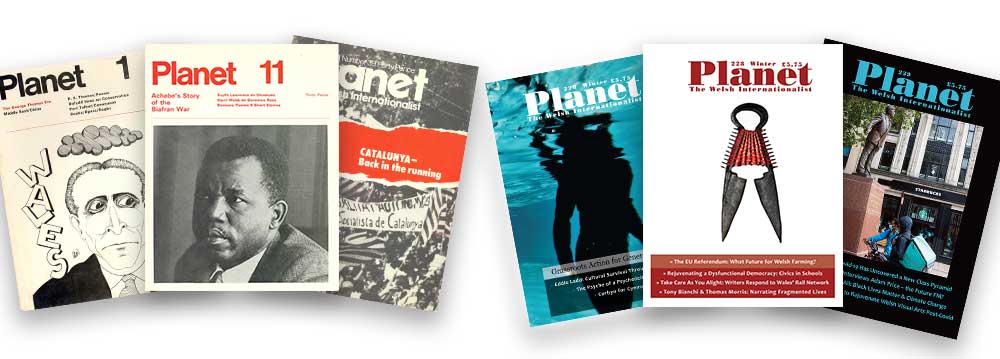Half a century of Planet: the Welsh Internationalist celebration!

2020 marked 50 years of Planet: the Welsh Internationalist magazine. While Covid-19 prevented us from gathering in person at the time, we were delighted to be able to put together an afternoon symposium plus an evening celebratory party on 17 September 2022 in Ceredigion Museum to belatedly mark half a century of Planet, and to fundraise for the magazine’s core costs in light of funding cuts followed by the pandemic, Brexit and rising costs. There were panel discussions, poetry, live music, a small exhibit, and most importantly crowds of current and prospective subscribers enjoying themselves.
In addition, we are also very grateful to the National Library of Wales for hosting an online event to celebrate half a century of Planet. Founding editor Ned Thomas and current editor Emily Trahair were in conversation with author Mike Parker, discussing what's changed, what hasn’t, and why a publication subtitled ‘The Welsh Internationalist’ is needed now more than ever. You can watch a recording of the event here.
Planet’s story“Time and again Planet has taken me upwards and outwards from the fulcrum of Wales to the furthest reaches of discussion and discovery.” “I know of no other magazine which collates Welsh ideas and values so thoughtfully with intellectual developments in the world at large, and interprets the results in such excellent journalism.” Jan Morris

Despite the gargantuan scale suggested by the magazine’s masthead, Planet is run as a micro-organisation, albeit one that seeks to over-reach the limitations of Wales’ political status to offer Welsh perspectives on the world and vice versa. Planet’s authors have included R.S. Thomas, Jan Morris, Raymond Williams, Chinua Achebe, Menna Elfyn, Leo Abse, Gwynfor Evans, Mererid Hopwood and Stevie Davies, and each issue has featured both ground-breaking established authors and emerging talent in its pages.
While sometimes perceived as a ‘cultural magazine’, Planet has always found ways to be a vessel for often radical political perspectives, from the first issue’s opening challenge to the legacy of George Thomas onwards (he'd recently departed as Secretary of State for Wales). The magazine arose out of the publication of The Welsh Extremist: a Culture in Crisis by its founding editor Ned Thomas – an appeal to the English New Left as to why they should be in solidarity with the Welsh-language movement. It has provided a platform for pioneering work on topics from political independence to climate change and species loss – often long before these issues were on the mainstream media agenda.
The magazine has also always had a core role of bridging different cultures within an often very fractured nation. This has sometimes taken the form of bringing Welsh-language material to an English-language readership for the first time in translation, including Saunders Lewis’ seminal Tynged yr Iaith speech, and work by writers including Kate Roberts and J.R. Jones. Latterly this ethos of unifying language cultures has been expressed through our ‘Welsh Keywords’ series, inspired by Keywords – by one of our former Patrons Raymond Williams.
At the same time, from the start, Planet has played an important role in the development of Welsh Writing in English, being one of the first outlets to publish pioneering work from Anglophone areas of Wales by writers including Ron Berry and Alun Richards; and latterly authors such as Rachel Trezise and Gee Williams. Our recent ‘Retracing Wales’ and ‘Reading Between the Lines’ series take the reader on journeys to different corners of Wales, and are examples of how Planet gives insights into diverse narratives of Welsh experience, and brings a fragmented country into dialogue with itself.
The magazine has also taken a pioneering approach to championing distinctively Welsh visual culture, being an early platform for art critics such as Peter Lord and Osi Rhys Osmond, and continues to offer rigorous critique of Welsh contemporary arts from the most challenging and avant-garde to the most popular.
Planet’s internationalism has taken many forms from the beginning and continues to evolve. The magazine has featured articles that connect Wales to other European stateless nations, from a feature by Sartre on the Burgos Trials and the rights of minority language speakers, to works by writers from Catalonia, Brittany, Scotland, Cornwall, Northern Ireland and beyond. Another recent form of internationalism has been a series that juxtaposes the cultural and political experiences of coalfield communities in Wales and across the world. From the start, when the field of ‘Postcolonial Literature’ was in its infancy, Planet has provided a platform for writers from post-colonial nations worldwide including Ngũgĩ wa Thiong'o, Jean Rhys and Naguib Mahfouz; and in latter years voices representing perspectives from the Global South – India, Cameroon, Iraq, Kurdistan and beyond in the work of (e.g.) Manoranjan Byapari, Eric Ngalle Charles, Rabab Ghazoul and Ciwanmerd Kulek
In its politics and social justice coverage, Planet has offered unique, in-depth commentary on a tumultuous half century for Wales, chronicling its anxieties and hopes throughout eras of the Cold War, Welsh-language direct-action protest, the emergence of feminism, the Miners’ Strike, Thatcherism, European integration, the development of devolution, the Iraq War, climate change, austerity, the EU referendum, Black Lives Matter and Covid-19, the latter discussed in our new series Breathing Freely: Possibilities for a Post-Pandemic Society.
As new crises and opportunities emerge on the horizon, Planet is making radical interventions in response to these contemporary urgencies as it did during other times of profound uncertainty, such as the lead-up to the 1979 devolution referendum.
Planet also runs a book imprint as Planet Books, which has published ground-breaking work such as Charlotte Williams’ Wales Book of the Year Award winning Sugar and Slate, and the first English-language translation of the controversial Galician modernist classic On a Bender, which includes passages suppressed by Franco.
Since 2009 we have published topical features, podcasts and videos online as Planet Extra, and in 2016 launched Planet Platform – a dedicated online space for work by students we have mentored in writing for publication. Our role in fostering the next generation of journalists and writers is also manifested in our annual Young Writers’ Essay Competition.
What others say about Planet“Planet is an outstanding publication that is absolutely vital to the public sphere in Wales.” Desolation Radio’s Dan Evans.
For more testimonials about Planet, from figures including Charlotte Williams, Mike Parker, Menna Elfyn, Jan Morris and Rachel Trezise see https://planetmagazine.org.uk/endorsements
For a special Planet Extra collage-article of responses to and anecdotes about Planet from our readers please see https://www.planetmagazine.org.uk/planet-extra/our-readers-respond-half-century-planet.
Press coverage of 50th anniversaryMany thanks to all those who published coverage of our anniversary, including O’r Pedwar Gwynt Rhys Mwyn on Radio Cymru, the novelist Xosé Luís Méndez Ferrín in the Galician daily paper Faro de Vigo, the Times Literary Supplement, Bro Aber360, Centro di documentazione sui popoli minacciati and the AmeriCymru website.

Here is an extract from a speech by Jan Morris from our 2010 40th birthday party at Aberystwyth Rugby Club!



